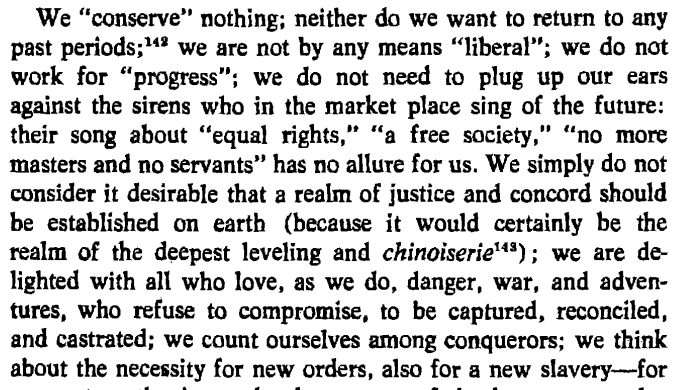Nietzsche Discussion Thread
-
Discuss your favorite Nietzsche quotes and ideas here.
-
@Sugar And those who were seen dancing were thought to be insane by those who could not hear the music.
-
From the Gay Science 377
Pretty much the Alt-right philosophy.
"Morality as Anti-Nature" essay in Twilight of the Idols
Pretty much the whole of Antichrist. Probably Nietzsche's best work and his most quotable one as well.
My favorite section from it is section 7.
"Christianity is called the religion of pity. Pity stands opposed to the tonic emotions which heighten our vitality! It has a depressing effect. We are deprived of strength when we feel pity. That loss of strength which suffering as such inflict on life is still further increased and multiplied by pity. Pity makes suffering contagious. Under certain circumstances, it may engender a total loss of life and vitality out of all proportion to the magnitude of the cause…” -
"[T]he answer to the question, "Do you understand Nietzsche?" is too often answered with a "Yes" by too many people. He has been judged a muddled romantic irrationalist; the forerunner of positivism, pragmatism, or Freud; an aristocrat cultural critic along the lines of Arnold and Ruskin; an ideologist decrying the demise of the bourgeois order; or an Aryan racist, and so forth. The list can go on for a very long time. Nietzsche has been linked somehow with almost every development of importance in contemporary philosophy, art, politics, and society.
Nietzsche is, perhaps purposely, somewhat responsible for the motley of his interpreters. The writings he leaves us lend themselves to a whole series of immediate interpretations, depending on what portion brings changes in the reader. This is due to the nature of the work itself; it never seems to tell what is being said, but at the same time, one has in reading it the inescapable feeling that it does (somewhere, somehow) mean something. Erich Heller writes very well about this problem:
"There are philosophies which, however difficult they may be, are in principle easy to teach and easy to learn. Of course, not everyone can teach or learn philosophy - any more than higher mathematics; but the philosophies of certain philosophers have this in common with higher mathematics: they present the simple alternative of being either understood or not understood. It is, in the last analysis, impossible to misunderstand them. This is true of Aristotle, or St. Thomas Aquinas, or Descartes, or Locke, or Kant. Such philosophies are like mountains: you climb to their tops or you give up. In either case, you will know what has happened and "where you are." But this is not so with the thought of Plato, or St. Augustine, or Pascal, or Kierkegaard, or Nietzsche. Their philosophies are like human faces on the features of which are inscribed, disquietingly, the destinies of souls; or like cities rich in history. "Do you understand Kant?" is like asking "Have you been to the summit of Mont Blanc?" The answer is yes or no. "Do you understand Nietzsche?" is like asking "Do you know Rome?" The answer is simple only if you have never been there.""
- Strong (2000) Friedrich Nietzsche and the politics of transfiguration, University of Illinois Press.
In other words, please don't shit up this thread with brain dead chud-babble.
-
@Kilgore hahaha "We are not liberal" they cry as they suck their thumbs and talk about how Milei is a Really Cool Guy
-
@CO3 What you wrote makes 0 sense.
-
@Kilgore What about it doesn't make sense bud?
-
@CO3 Because you are implying that Milei is a libtard which he isn't. He does indeed seem to be a cool guy.
-
@jhp said in Nietzsche Discussion Thread:
This is true of Aristotle, or St. Thomas Aquinas, or Descartes, or Locke, or Kant. Such philosophies are like mountains: you climb to their tops or you give up. In either case, you will know what has happened and "where you are." But this is not so with the thought of Plato, or St. Augustine, or Pascal, or Kierkegaard, or Nietzsche. Their philosophies are like human faces on the features of which are inscribed, disquietingly, the destinies of souls; or like cities rich in history.
If you are familiar with Jungian typology, the philosophers in the first group lead with introverted or extroverted thinking functions. Hence the logical and explicit progression of their thoughts. The second group consists of dominant intuitives and feelers. Their thoughts have a more implicit and less definite nature. Due to the reductive nature of translating intuitive thought processes into written form, almost as much meaning is communicated by what is left unsaid as by what is actually written down on the paper. Hence the works of intuitive philosophers partially act as a mirror into the reader's own mind, so that everyone, depending on their innate and acquired disposition, will end up with a different interpretation of their message.
-
@Kilgore bruh
-
@jhp You're a retarded faggot.
-
The Greeks were not nearly as Dionysian as Nietzsche said. Nietzsche also led a mediocre life. What I value about Nietzsche is the hieracrism and the desire to overpower the dorks. I am a great despicer myself.
-
@eugene seethe chuddie
-
@jhp I think that is the nature of Beyond Good And Evil. Non dual.
BGnE reminds me of Hakuin's Zen Words On The True Heart. Which is also a, sometimes hilarious and always pithy, intimate missive regarding the non-dual glimpse into our own projections. And also yerrag recently pointed to an important insight regarding inner guidance and the Holy Spirit.
-
This post is deleted! -
Nietzche was a weird gay boy.
-
@RawGoatMilk88 said in Nietzsche Discussion Thread:
Nietzche was a weird gay boy.
-
Speculation
-
BTW According to Nietzsche, your opinion may be a sign of weakness/resentment and slave mentality...
-
[Block]
-
-
Nietzsche had knowledge yet…
Gnostic and freemason?
No wisdom -
@Sugar Taking time to read (old hardcover editions of) his books would be more personally (and thus collectively) valuable than seeking out hot takes and quotes. Internet culture is anti-intellectual in this regard and kills peoples attention spans. People look for summaries and impressions rather than going on an intellectual walk with the author themselves through a patient reading of their own words.